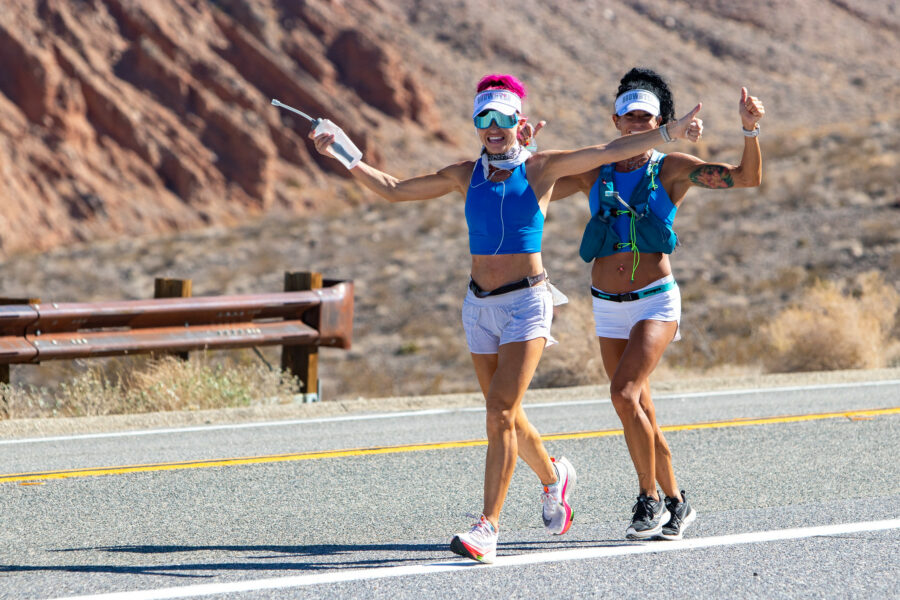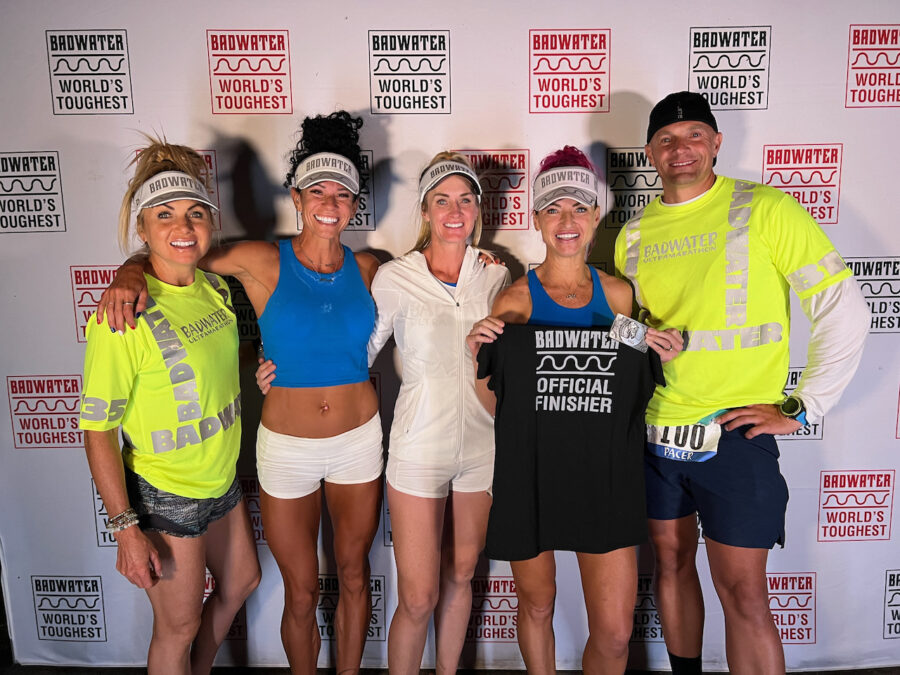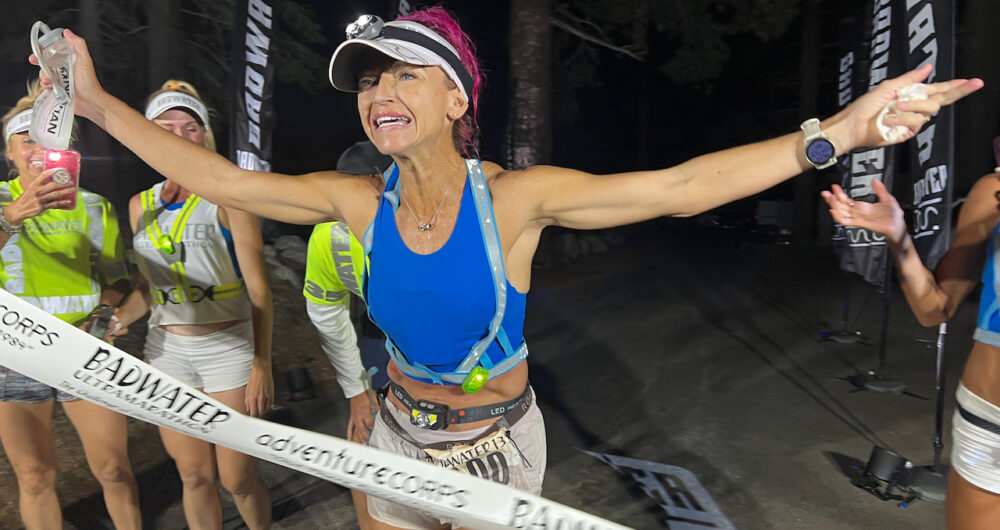Badwater 135: Big Fish in a Small Pond, Beware!
– Some History and Context about “Outlier” Performances
For the past 23 years, it has been my great pleasure to lead the team which hosts the Badwater 135 Ultramarathon. Since our very first race in 2000, Badwater 135 runners have been giving amazing – and sometimes astonishing – performances on the race course. Human potential is truly incredible and we love providing the venue and opportunity for women and men to redefine what is possible.
For the first 13 editions of the race, there was very little International participation. It was mostly Americans, Brits, and other English speakers. The field was normally 12 to 25 runners (with 42 in 1999, the last year under the original leadership of the race.)
When I took the event over in 2000, my vision was that Badwater 135 would intentionally welcome runners carrying flags from across the globe, as well as endurance athletes with all kinds of varying backgrounds. We encouraged and embraced not only all the ultra runners who wanted to participate, but also ultra triathletes, mountaineers, and ultra cyclists, as long as they met the qualifying criteria and were selected to race. My goal was and remains to make Badwater 135 as competitive, as interesting, as diverse, and as international as possible.
We instantly began to achieve that goal at our first race in 2000, when the top five finishers came from Russia, Slovenia, Japan, Russia, and Russia, in that order. The Badwater veterans learned they had been “big fish in a small pond” when the men’s and women’s records were broken, with the Russian men’s winner five hours ahead of the lead American and the Russian women’s winner over 11 hours ahead of the next woman. It was a wake-up call to the nearly entirely American race field that there was a much wider body of ultra athletes out there capable of excelling at this race. But they weren’t only foreigners.
Just two years later, in 2002, a woman won the race overall: Pam Reed of Tucson, Arizona took first overall with an astonishing gap of over four hours and forty minutes ahead of the next runner, the first man (27:56:47 versus 32:38:57.) She was over nine hours ahead of the next woman.
In 2002, Pam had started in the first wave and ran away from the whole race field immediately. She came back in 2003, started in the third wave, and won again. This time Dean Karnazes finished 24 minutes behind her, but the next finisher – the 2nd woman – was over five hours back. (The following year, Reed took fourth while Karnazes won with a four-hour margin over Reed, but just eight minutes over 2nd place.)
In 2005, Scott Jurek won the race in his rookie debut in a time of 24:36:08. He was arguably the greatest male American ultra runner at the time, but what made his win startling was that it came just one weekend after his seventh – and final – Western States 100 win. That is some amazing recovery. (The following year he dedicated his season to training for Badwater 135, and did all the right things in terms of heat training, road training, and such; he won again, but in a slower time.)
In 2006, David Goggins entered for the first time. He is a very muscular, large man, and he had extremely limited running experience, basically just one 24-hour race plus the HURT 100. (In real life, he was a Navy SEAL and has phenomenal overall fitness and strength.) In his rookie debut, he placed fifth in 30:18:54, coming in behind four of the biggest names in ultra running at the time: Scott Jurek, Akos Konya, Charlie Engle, and Ferg Hawke. He was also three hours ahead of Dean Karnazes.
In 2007, Goggins finished in third place with a time of 25:49:40, behind new course record breaker Valmir Nunes and runner-up (again) Akos Konya, something nobody would have predicted given Goggins’ physique and his limited running background.
In 2007, Jamie Donaldson took over 41 hours during her rookie debut, but then she returned in 2008 to win in a time of 26:51:33, a shocking 17 hour improvement and a new women’s record. She won three years in a row and broke her own women’s record in 2010 with a 25:53:07. (She then retired from the sport.)
In 2012, 70-year-old Arthur Webb completed the race in 33:45:40, setting a still unbroken 70+ age group record. Webb had started competing in Badwater 135 at age 56; it was this 15th consecutive race in 2012 when he not only set his amazing 70+ record, but also set his fastest personal record. He placed 29th out of 96; the average age of the runners ahead of him was 43.7 and the oldest ahead of him was just 60.
In 2013, a “previously unknown” 49-year-old Australian named Grant Maughan entered the race and placed second, just 15 minutes behind the winner, in 24:53:57. (He would take second again the following year, and eventually finish seven times.)
In 2015, Pete Kostelnick entered for the second time. He had run an impressive 30:38:09 in his rookie debut in 2014, but just one year later he ran 23:27:10 – an astonishing improvement of over seven hours. A year later, in 2016, he broke Valmir Nunes’ nine-year-old men’s record with a time of 21:56:32. (Since then, Pete has finished seven hours slower, thirteen hours slower, and DNF’d twice. But during Pete’s slowest Badwater 135, he ran from Lone Pine to the Whitney Portal finish line faster than anyone before or since: 2:21 for the 13 miles 5000 feet of ascent.)
In 2019, both course records were broken by rookie entrants. Yoshihiko Ishikawa of Japan set a new men’s record of 21:33:01, finishing 2 hours and 40 minutes ahead of the 2nd place finisher – and new women’s record breaker – Patricyja Bereznowska of Poland. Bereznowska broke Jamie Donaldson’s 2010 women’s record by 23 minutes and was the first woman to finish on the podium (top three overall) since 2010 and the first woman to ever place second overall. Nearly five hours behind Ishikawa and two hours behind Bereznowska was the third finisher, and second man, American Harvey Lewis in 26:11:18.
In 2022, the women’s course record fell as Ashley Paulson, a professional triathlete with six ultramarathon wins, ran just under four minutes faster than Bereznowska two years prior, and also placed third overall.

Ashley Paulson and pacer descend Towne Pass into the Panamint Valley during the 2022 Badwater 135.
Of course there have been MANY incredible performances besides those that I have mentioned here, but this gives a good idea of the “outlier” performances that take place somewhat often at Badwater 135 while the rest of the field puts in pretty consistent performances. (Scientists call this “punctuated equilibrium.”)
None of this should be a surprise, because the sport is still young, everyone is still learning, plus the overwhelming majority of the planet doesn’t participate in ultra running. (The pond is still relatively small, but when new big fish make it to Badwater, amazing things will often happen.)
The previous Badwater 135 race director told me that he didn’t let in non-English speakers, plus the race field was very small. But when I promoted the race world-wide, five foreigners came in and set the bar much higher at our first race. (Five years went by before Scott Jurek broke the men’s record and returned it to American hands. But two years later, as ultra running grew in Brazil – in large part because of our sister race, Brazil 135 – the Brazilian Valmir Nunes broke Jurek’s record by nearly two hours.)
The majority of these incredible performances are simply the result of remarkable talent coming to Death Valley to compete in the Badwater 135. Basically, the pond is becoming bigger and bigger as it becomes more and more international. As a result, those previously “big fish” have found they aren’t as big as they thought.
Races are generally won – and records sometimes broken – by runners with more talent, higher pain thresholds, better and more consistent training and preparation. (That, plus being born with excellent DNA.)
When I look over the amazing Badwater 135 performances cited above, it basically comes down to bigger fish joining the race, or existing fish becoming bigger over time. For example, Badwater 135 has featured breakout performances by:
– Athletes who are world-class ultra runners, such as 24-hour and 48-hour record holders, Spartathlon champions, and similar, as in the case in 2000 and 2019 (and some years in between) and with many of our top foreign runners who finish on the podium.
– Athletes who are just exceptional and they “discovered” their incredible talent – as we discovered them – because of Badwater 135, such as Pam Reed and Grant Maughan.
– Athletes with simply more will and the most mind-blowing training and commitment (Goggins, in particular.)
– Athletes who “become bigger fish” during their years of Badwater 135 competition by training harder and smarter each year, honing their craft, and executing exceptional race strategies. (Pete Kostelnick’s first three races, plus Jamie Donaldson and Arthur Webb.)
– And one last category of athlete who I will describe below.
Despite how “astonishing” the various Badwater 135 performances cited above are, I have never heard a single one of these exceptional athletes be accused of cheating. Likewise, I have never believed that any of these athletes cheated, nor was I ever presented with evidence – or even a suggestion – that they cheated in any way. On the contrary, the ultra running community has accepted ALL of these incredible athletes and their exceptional performances with open arms and has celebrated all of them.
I believe this is because people trust “their own” people (fellow ultra runners) and because people generally accept one another at face value and with good will. I would also hope that the ultra running community knows that we take our organization of this race extremely seriously and that we work very hard to provide a safe, fair, and well managed race.
And yet, here we are today with swift condemnation of an “outlier” performance by an “outlier” athlete, Ashley Paulson, our women’s champion, third place overall finisher, and new women’s course record holder.
She was a rookie this year, and was accepted into the race with an exceptional athletic resumé – but a resumé that is not the “standard, well-known ultra runner” resumé that the majority of the field has.
Yes, she had won the six ultramarathons that she has entered, including The Bear 100 in Utah. But she has also been a professional triathlete for eight years, placing in the top ten in multiple Ironman Triathlons, with a personal best of 9:18:48 at Ironman Cozumel in 2017. That represents a level of athletic talent that is far beyond what nearly any triathlete – or ultra runner – can imagine, let alone deliver.
And yes, her history does include a six-month doping infraction suspension that she served seven years ago – something that we discussed and considered internally. Given that her own professional triathletes organization welcomed her back into triathlon, we felt no obligation nor desire to discriminate against her and refuse her entry in the race. She deserved the chance to race, and to be judged exclusively on the merits of her performance on the Badwater 135 race course.
During the 2022 Badwater 135, we consistently saw Ashley Paulson running a fast, smooth, impressive, competitive race. As far as we know and observed, she and her support crew participated in an exemplary manner.
We have nearly 50 race staff who are out on and patrolling the course continuously. Every time we observed her, she was running fast, she was running with exceptional form, and she was smiling, happy, and engaging. She was clearly thriving as she competed against some of the best ultra runners on a brutal course. Living in both Florida and Utah, she didn’t seem to be impacted by the heat, either. She never wavered. From what we saw, she ran a perfect race.
And so I would add that there is one more type of athlete who may give an “outlier” performance at Badwater 135:
– World-class athletes from other endurance disciplines, who bring a level of fitness, strength, endurance, and highly effective training that exceeds the training typical for ultra runners who mainly – or exclusively – run lots of big miles. (In this case I am referring to Ashley Paulson, and having the highly respected Ryan Hall as her coach is also a huge asset to Ashley and further evidence of her exceptional training.)
Ashley Paulson is an “outlier” in not really being part of the ultra running community. She was not a known name. She doesn’t have the “credentials” that some ultra runners think are necessary to compete at the highest level, or to break records.
But for me, and for our organization, with decades of experience organizing – and participating in – ultra cycling, ultra triathlon, and ultra running, we found her victory not only totally believable, but unsurprising. To the best of our knowledge, she earned her win and her record by arriving at the start line as a world-class endurance athlete, and by running faster, smarter, and more consistently than all the women and all but two of the men.
One of the principles of American society is the concept of “innocent until proven guilty.” That seems to be sadly lost on all those who rush to judgement and we see some keyboard warriors quick to attack Ashley and demand that she “prove her innocence.”
But innocence need not be proven; quite the contrary, compelling evidence to prove guilt must be presented. So far, we have seen no such evidence and have mainly seen character assassination, hearsay, conjecture, and bruised egos. We also note that her biggest detractors seem to be men who are perhaps threatened by a woman who can and does beat them, and by women who may be threatened by a talented outsider coming into “their sport.” (“Let’s keep that big fish out of “our” pond!”)
Of course, we will continue to look into – and act upon – any credible information that comes our way regarding Ashley, or regarding any other competitor in this year’s race. But without compelling, conclusive evidence of her guilt, we will continue to support and celebrate Ashley Paulson as the 2022 Badwater 135 women’s champion and new course record holder.
7-25-2022 Update: Talk about an independent, third party! Without even contacting our organization or me for comments or insights, the Marathon Investigation website operator has completed his detailed analysis of Ashley Paulson’s record-breaking Badwater 135 victory and concluded that “As analyzed by myself, and by a third party, the data is clean and would indicate that Ashley ran the race legitimately.” and “I hope that the community will fully accept that Ashley ran legitimately and recognize her achievement.”
Yours in sport,
Chris Kostman,
Chief Adventure Officer and Race Director
AdventureCORPS, Inc.,
organizers of the world-wide series of Badwater® races










